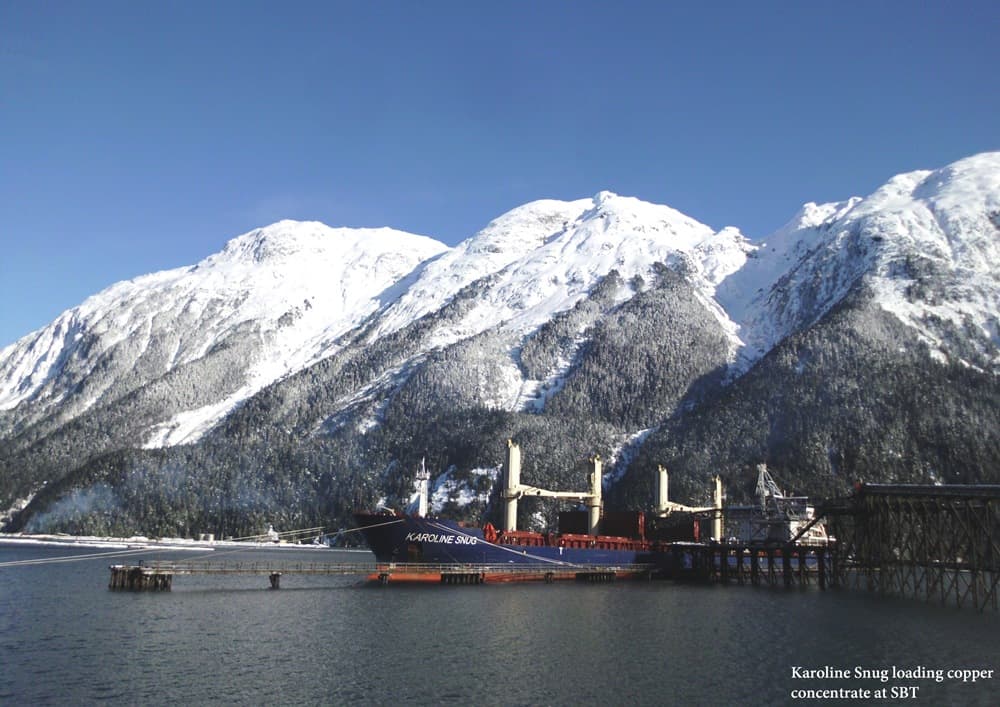First Nations acquire Port of Stewart Bulk Terminal
Officials say the deal creates a vertically integrated supply chain to improve efficiency and safety.

Key Takeaways:
- The Nisga’a Nation, Tahltan Nation and Arrow Transportation are jointly acquiring the Port of Stewart Bulk Terminal and consolidating regional trucking operations under a new partnership.
- The deep-sea terminal is a key export point for copper and gold concentrate from northwest B.C.’s mining sector, including Newmont’s Brucejack and Red Chris mines, and currently operates at about half capacity.
- The deal gives the Indigenous nations equal ownership and control over major regional infrastructure, backed by a $5-million provincial grant and support from Newmont, marking a significant step in advancing Indigenous economic sovereignty and participation in Canada’s critical minerals supply chain.
The Whole Story:
The Nisga’a Nation and Tahltan Nation are joining forces with Arrow Transportation Systems Inc. to acquire the Port of Stewart Bulk Terminal, a deep-sea shipping facility in northwestern British Columbia that serves as an export hub for critical minerals.
The three groups have formed Portland Canal Holdings Limited Partnership, which has signed a binding agreement to purchase Stewart Bulk Terminals Ltd., the owner and operator of the facility. The deal is expected to close in the coming months, subject to regulatory approvals and other customary conditions.
The joint venture will also consolidate Arrow’s Stewart trucking division with the Tahltan-Arrow Transportation Limited Partnership, which already hauls bulk commodities in Tahltan Territory. Together, the new entity will control both port and trucking operations through separate subsidiaries, with each partner holding equal ownership, board representation and profit rights.
“This acquisition of a strategic asset will drive economic growth, create opportunities and strengthen our Nations’ self-determination,” said Kerry Carlick, president of the Tahltan Central Government. “I can only imagine how proud our Tahltan and Nisga’a ancestors would be.”
Nisg̱a’a Lisims Government president Eva Clayton said the partnership allows the Nisga’a Nation to help manage an important piece of infrastructure within its territory. “This represents an opportunity for the Nisga’a Nation to be involved in efficiently operating and expanding an integral asset in a way that is environmentally responsible,” she said.
Arrow executive vice-president Tim Bell said the deal creates a vertically integrated supply chain that will improve efficiency and safety. “By consolidating the port terminal and our regional trucking operations, we are creating long-term, high-quality jobs while advancing economic reconciliation and unlocking generational opportunities,” he said.
The Port of Stewart sits on six acres at the northern tip of the Portland Canal and is fully permitted as a deep-sea shipping terminal. It was originally designed to provide export access for copper concentrate and has operated under private ownership since 1994, most recently by the Soucie family. The facility currently employs six full-time staff and handles about 260,000 tonnes of copper and gold concentrate a year — about half its rated capacity.
The terminal is a critical link for the mining sector in B.C.’s mineral-rich northwest, where more than 50 per cent of the province’s exploration activity takes place. Current customers include Newmont’s Brucejack and Red Chris mines, both located within Nisga’a and Tahltan territories.
Provincial officials have framed the transaction as part of B.C.’s “Northwest Strategy,” which aims to balance mining development with reconciliation and conservation. The province has provided a $5-million grant to support the purchase.
“This joint venture is a great example of what can be achieved when you see an opportunity and work to make it a reality,” Premier David Eby said. “It furthers reconciliation and creates good jobs while demonstrating how British Columbia will become Canada’s new economic engine.”
Mining and Critical Minerals Minister Jagrup Brar said the investment will strengthen export capacity and support industrial growth in the northwest. “This contribution advances reconciliation through meaningful economic inclusion and partnership,” he said.
Newmont, one of the largest mining companies operating in the region, is also backing the deal. Abdul Rahman Amoadu, managing director for the company’s Africa and Canada business unit, said Newmont’s support goes beyond exporting minerals. “It involves empowering our First Nation partners in owning the infrastructure that will define the region,” he said.
For both the Nisga’a and Tahltan Nations, the acquisition represents a long-sought opportunity to play a larger role in managing resource infrastructure on their territories. Tahltan leaders described it as another step toward economic sovereignty. “Generations of Tahltans have expressed their desire for greater control over the resources within our Territory,” said Chief Richard (Rocky) Jackson of the Tahltan Band.
With new ownership in place, the partnership says it plans to optimize use of the port, expand services, and help unlock economic opportunities tied to critical minerals development in northwestern B.C., Canada and beyond.
